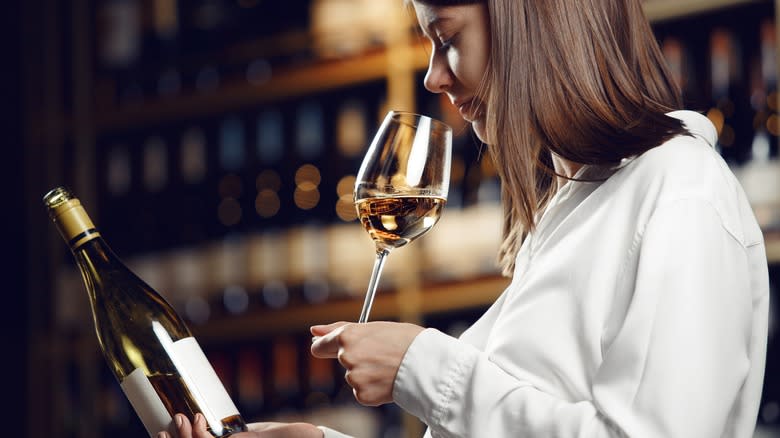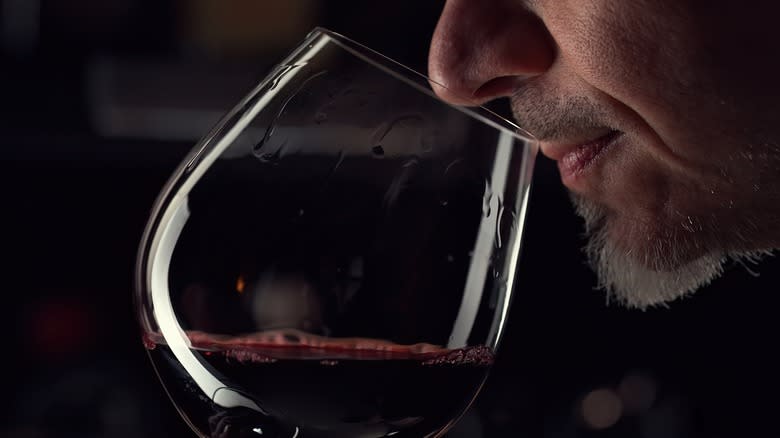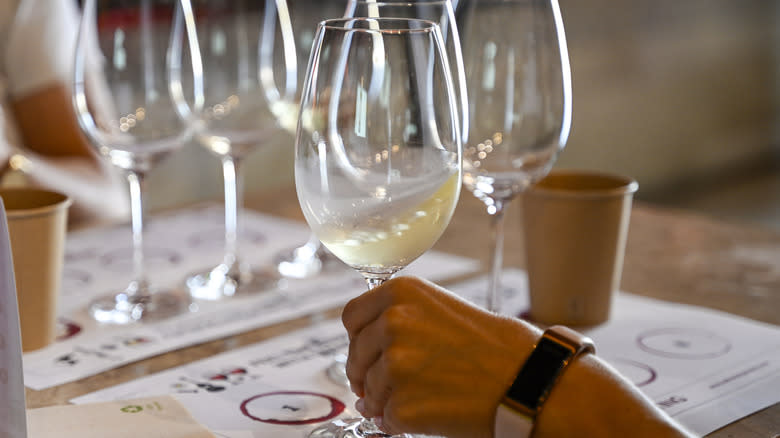Here's How The Aroma Of Your Wine Impacts Taste, According To An Expert

If you've ever gone to a wine tasting event, you may have noticed that the sommelier doesn't just speak on the tasting notes you'll pick up on in the drink; they also frequently discuss the aroma of the wine. Now, you might think this is something to readily dismiss, but in fact, the smell of the wine may be more important than you think.
Matt Strauch, general manager and wine director of Noble Riot, spoke with Daily Meal and provided some exclusive insights into why you should pay attention to the scent of your wine. He said, "Aroma significantly impacts taste. When you inhale the aromas with your mouth and then exhale through your nose, you experience retronasal olfaction. This process combines the senses of smell and taste, allowing you to perceive the full spectrum of flavors in the wine." Ultimately, this creates a unique tasting experience and gives each bottle or blend its own specific flavor.
Read more: French Cooking Tricks You Need In Your Life
The Science Connection Between Wine's Taste And Aroma

Aroma has a direct connection with how your wine tastes. In fact, 80% of what we taste comes from how a food or beverage smells. Matt Strauch explains, "Taste is influenced by the balance of alcohol, acids, and flavors such as salt, sour, bitter, sweet, and umami." If it were entirely up to your tongue, you'd only pick up those five main flavor profiles Strauch mentioned. But when combined with aromas, you can pinpoint more nuanced tastes such as earthy tones and fruitiness. That means you wind up wind up with a more complex tasting experience.
Strauch comments that if you want to ramp up your wine-tasting knowledge even further, there are some other great resources to check out. For instance, there are books that go deeper on the subject. The wine expert says, "For an in-depth understanding, I recommend Gordon Shepard's 'Neuroenology: How The Brain Creates The Taste of Wine.'"
How To Boost The Aroma Of Your Wine

There are a few steps you can take to boost a wine's aroma and maximize the connection between its scent and flavor. For one thing, you can decant your wine. Decanting oxidizes the wine, which enhances its natural aroma, softens harsh tannins, and releases sulfites that can create an unpleasant smell and taste (think rotten eggs). If you don't have a decanter, you can still get delicious wine without one by simply pouring the wine from one glass into another. This simulates the movement of the decanter, helping to oxidize and aerate your wine.
A simpler method for oxidizing wine and releasing flavors can be done just by swirling your glass. Swirling also aerates the wine, thus leading to a more aromatic and flavorful glass. And, to aid swirling, you'll also want to pay attention to how you hold your wine glass. Grip the glass by the stem, which makes it easier to fully swirl the drink and also prevents your body heat from warming the wine and altering its taste and aroma. With these little tips and tricks, you can maximize on Matt Strauch's advice. Remember, he explains that, "Together, aromas and tastes create a complex sensory experience." And by implementing these tricks, you can enjoy a more nuanced wine flavor.
Read the original article on The Daily Meal

 Yahoo Lifestyle
Yahoo Lifestyle 
